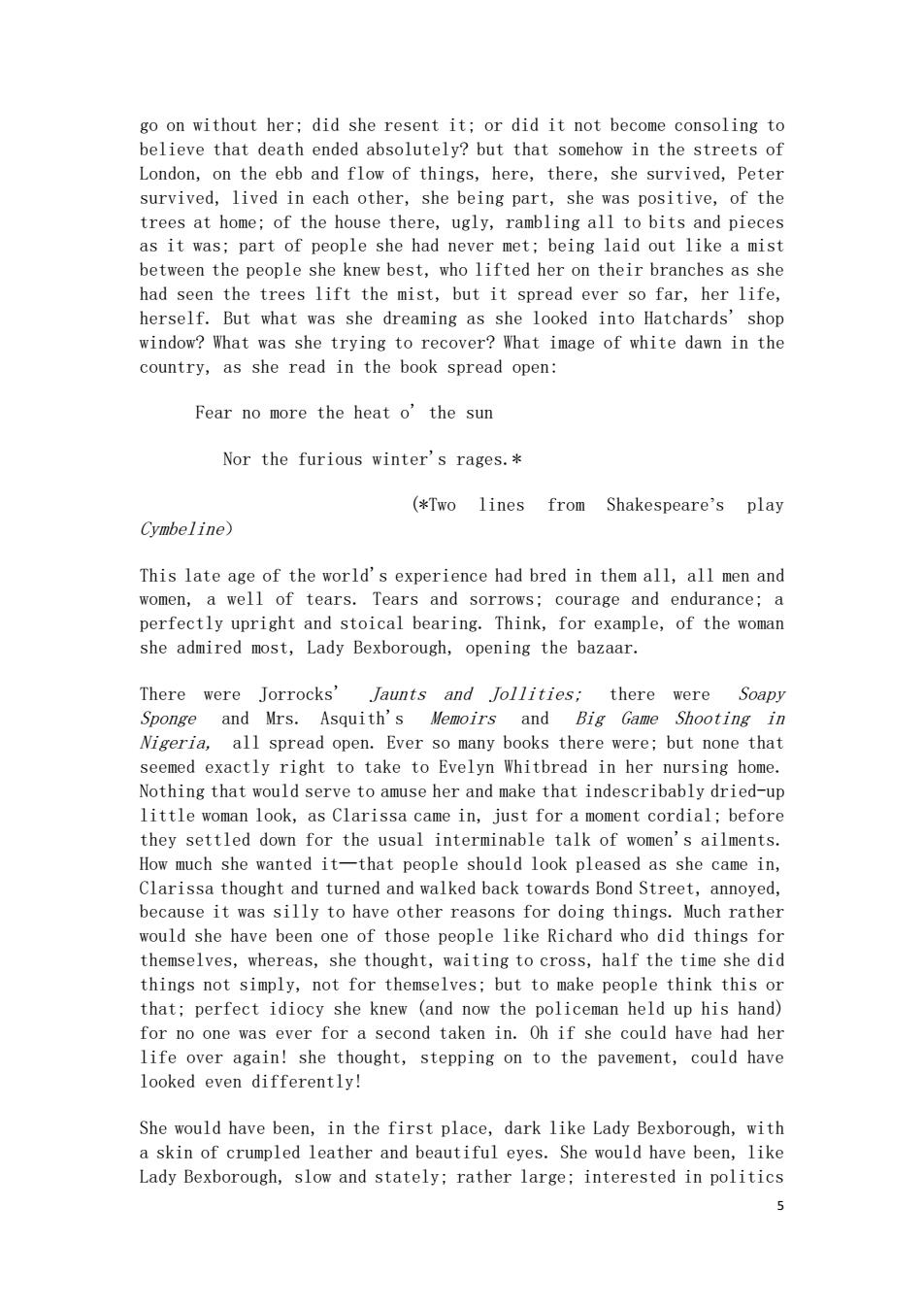正在加载图片...

go on without her;did she resent it;or did it not become consoling to believe that death ended absolutely?but that somehow in the streets of London,on the ebb and flow of things,here,there,she survived,Peter survived,lived in each other,she being part,she was positive,of the trees at home;of the house there,ugly,rambling all to bits and pieces as it was;part of people she had never met;being laid out like a mist between the people she knew best,who lifted her on their branches as she had seen the trees lift the mist,but it spread ever so far,her life, herself.But what was she dreaming as she looked into Hatchards'shop window?What was she trying to recover?What image of white dawn in the country,as she read in the book spread open: Fear no more the heat o'the sun Nor the furious winter's rages. (*Two lines from Shakespeare's play Cymbeline) This late age of the world's experience had bred in them all,all men and women,a well of tears.Tears and sorrows;courage and endurance;a perfectly upright and stoical bearing.Think,for example,of the woman she admired most,Lady Bexborough,opening the bazaar. There were Jorrocks'Jaunts and Jollities;there were Soapy Sponge and Mrs.Asquith's Memoirs and Big Game Shooting in Nigeria,all spread open.Ever so many books there were;but none that seemed exactly right to take to Evelyn Whitbread in her nursing home. Nothing that would serve to amuse her and make that indescribably dried-up little woman look,as Clarissa came in,just for a moment cordial;before they settled down for the usual interminable talk of women's ailments. How much she wanted it-that people should look pleased as she came in, Clarissa thought and turned and walked back towards Bond Street,annoyed, because it was silly to have other reasons for doing things.Much rather would she have been one of those people like Richard who did things for themselves,whereas,she thought,waiting to cross,half the time she did things not simply,not for themselves;but to make people think this or that;perfect idiocy she knew (and now the policeman held up his hand) for no one was ever for a second taken in.Oh if she could have had her life over again!she thought,stepping on to the pavement,could have looked even differently! She would have been,in the first place,dark like Lady Bexborough,with a skin of crumpled leather and beautiful eyes.She would have been,like Lady Bexborough,slow and stately;rather large;interested in politics 55 go on without her; did she resent it; or did it not become consoling to believe that death ended absolutely? but that somehow in the streets of London, on the ebb and flow of things, here, there, she survived, Peter survived, lived in each other, she being part, she was positive, of the trees at home; of the house there, ugly, rambling all to bits and pieces as it was; part of people she had never met; being laid out like a mist between the people she knew best, who lifted her on their branches as she had seen the trees lift the mist, but it spread ever so far, her life, herself. But what was she dreaming as she looked into Hatchards' shop window? What was she trying to recover? What image of white dawn in the country, as she read in the book spread open: Fear no more the heat o' the sun Nor the furious winter's rages.* (*Two lines from Shakespeare’s play Cymbeline) This late age of the world's experience had bred in them all, all men and women, a well of tears. Tears and sorrows; courage and endurance; a perfectly upright and stoical bearing. Think, for example, of the woman she admired most, Lady Bexborough, opening the bazaar. There were Jorrocks' Jaunts and Jollities; there were Soapy Sponge and Mrs. Asquith's Memoirs and Big Game Shooting in Nigeria, all spread open. Ever so many books there were; but none that seemed exactly right to take to Evelyn Whitbread in her nursing home. Nothing that would serve to amuse her and make that indescribably dried-up little woman look, as Clarissa came in, just for a moment cordial; before they settled down for the usual interminable talk of women's ailments. How much she wanted it—that people should look pleased as she came in, Clarissa thought and turned and walked back towards Bond Street, annoyed, because it was silly to have other reasons for doing things. Much rather would she have been one of those people like Richard who did things for themselves, whereas, she thought, waiting to cross, half the time she did things not simply, not for themselves; but to make people think this or that; perfect idiocy she knew (and now the policeman held up his hand) for no one was ever for a second taken in. Oh if she could have had her life over again! she thought, stepping on to the pavement, could have looked even differently! She would have been, in the first place, dark like Lady Bexborough, with a skin of crumpled leather and beautiful eyes. She would have been, like Lady Bexborough, slow and stately; rather large; interested in politics